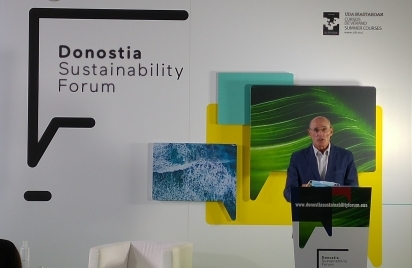The Pan-European Commission on Health and Sustainable Development is to study the increasingly close link between environmental deterioration and health
<p> A member of the WHO Pan-European Commission on Health and Sustainable Development chaired by Mario Monti, which is to guide countries on how to prepare their health systems for future pandemics, Rafael Bengoa was explaining why this commission will be closely linked to the environment. One of its jobs in the next 10 months will be to study and demonstrate the ever-closer link between environmental deterioration and world health.</p>

Talking about the virus as if it were a strategic attack without realising that we are the ones who created the ideal conditions for it is surreal. There is no time to stop new cases of zoonosis because climate change cannot be compensated for in time to avoid them. If politicians believe this, there can be no ideological argument about budgets. The change must be radical in terms of health, the environment and social services. Rafael Bengoa regretted that he had not seen governments working together.
As far as he was aware the government of Pedro Sánchez had no committee of experts, unlike the 3 in Great Britain, 2 in Sweden and one in the USA, and he was unhappy about this because it is repeating the pattern of poor communication between political decision-makers and science. After reviewing the evolution of the pandemic in different countries, he underlined the good results and speed of decision-making in Italy and Germany. "These decisions cannot be in the hands of judges - they are decisions that need to be taken in hours."
Credibility and Leadership
Rafael Bengoa based his presentation on what we know about the ten influenza pandemics of the last 250 years. They always come in waves with stronger second waves. Many "decisions" ruled out this possibility. Confinement worked, deconfinement did not. "The positive side we all have worked against us at that time."
Thus, public behaviour got out of our hands, as did the necessary organisation of tracers. When tracing failed because of a lack of tracers, all that remained was to micro-confine the population by neighbourhoods and if this did not work to lock down the whole city again. "This is how pandemics have always been controlled. Until we have a vaccine, we will be in this situation for months."
The outlook he painted for the future included a third wave involving the recovery of people who did not get the care they needed during lockdown and are starting to appear at health centres. The fourth wave, the so-called invisible wave, involves mental health. There are studies that indicate this is not so serious, but others talk about depressive tendencies and suicides among the population. Rafael Bengoa repeated the word "invisible" because nobody will be coming out to protest, but attention must be paid to it because it is serious.
However, he struck a note of optimism when he commented that the effects of seasonal influenza in the southern hemisphere are milder than in the last two decades because the use of face masks and social distancing are holding it back. If we take all protective measures, there might be some light at the end of the tunnel.
Global Swiss cheese: all anti-pandemic defences have failed.
Countries had seriously weakened public healthcare to control a pandemic, added to the situation in care homes and a social service model in need of an overhaul, as well as an ineffective relationship between science and government.
The solutions to this situation involve re-thinking decisions that have not worked. If public healthcare has not worked it needs reinforcing. What he most wanted to denounce was monolithic thought, because this is what has led and is also leading now to failure. Government and political parties think that everything can be controlled with their internal teams, without using outside experts. "The 40 or 50 experts I know have been supporting the media more than governments." Monolithic thought combined with an optimistic bent lead to poor decisions, warned Rafael Bengoa. "This is not a party political decision, but something much more serious." Rafael Bengoa suggested setting up an independent public body combining health and the environment.

